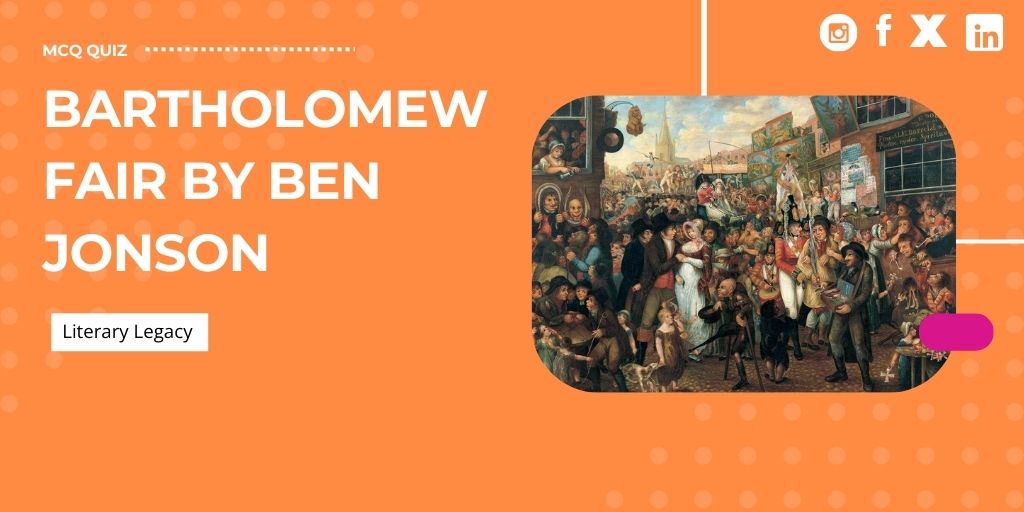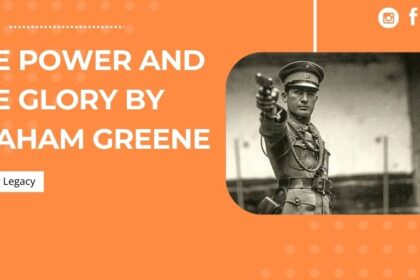Bartholomew Fair
1. What is the main setting of Bartholomew Fair?
Choices
A) A popular summer fair in London
B) A royal court
C) A rural farm
D) A family estate
Answer: (A)
A popular summer fair in London
Bartholomew Fair is set in a lively summer fair in London, attracting various social classes.
2. Who is the character that aspires to please Dame Purecraft?
Choices
A) Quarlous
B) Mr. Busy
C) Mr. John Littlewit
D) Adam Overdo
Answer: (C)
Mr. John Littlewit
Mr. John Littlewit and his friends plot to win over Dame Purecraft.
3. What comedic element does Johnson employ within Bartholomew Fair?
Choices
A) Meta-commentary on playwriting
B) Direct audience interaction
C) Tragic love stories
D) Complex plot twists
Answer: (A)
Meta-commentary on playwriting
Johnson blends farce with meta-commentary, adding a layer of humor about the play itself.
4. What does the character Adam Overdo intend to do in Bartholomew Fair?
Choices
A) Sell meat
B) Seek romance
C) Disguise himself to restore order
D) Entertain the audience
Answer: (C)
Disguise himself to restore order
Adam Overdo plans to disguise himself to address the moral decline he observes.
5. What is a major theme present in Bartholomew Fair?
Choices
A) Social commentary on Jacobean society
B) Historical documentary
C) Fantasy adventures
D) The rise of technology
Answer: (A)
Social commentary on Jacobean society
The play reflects the social realities and changes of the Jacobean period in London.
6. Who does the character Zeal-of-the-Land Busy represent in the play?
Choices
A) A wealthy merchant
B) A playwright
C) A police officer
D) A Puritan suitor
Answer: (D)
A Puritan suitor
Zeal-of-the-Land Busy is depicted as a Puritan and suitor of Dame Purecraft.
7. What do Mr. Littlewit and his friends hope to achieve by attending Bartholomew Fair?
Choices
A) To challenge moral decay
B) To watch a puppet show
C) To eat unclean animals
D) To stage a political play
Answer: (B)
To watch a puppet show
They attend the fair to see a puppet show that Littlewit produced.
8. How does the play address audience criticism?
Choices
A) It allows for anonymous feedback
B) It avoids talking to the audience
C) It encourages free speech
D) It requires a financial relation to criticism
Answer: (D)
It requires a financial relation to criticism
The book-keeper states that audience members can only criticize based on their ticket cost.
9. What is a notable feature of Bartholomew Fair as a setting?
Choices
A) It is only attended by the elite
B) It includes exhibitions of animals
C) It attracts all social classes
D) It is a small village gathering
Answer: (C)
It attracts all social classes
The fair attracts a diverse crowd, including both aristocrats and lower-class individuals.
10. What significant event can be observed at Bartholomew Fair?
Choices
A) Public executions
B) Royal ceremonies
C) Scientific lectures
D) Art exhibitions
Answer: (A)
Public executions
Bartholomew Fair included various entertainments, including public executions.
11. What motivates Winwife’s change in affections?
Choices
A) He is searching for a wife.
B) He prefers the company of older women.
C) He wants to marry Dame Purecraft.
D) He feels pressured by his friends.
Answer: (A)
He is searching for a wife.
Winwife is specifically looking for a wife, which leads him to pursue Grace Welborn.
12. What role does Trouble-All play in the escape from jail?
Choices
A) He fights with the guards, allowing for an escape.
B) He is a guard who helps the prisoners.
C) He locks everyone in jail.
D) He distracts the guards by causing a scene.
Answer: (A)
He fights with the guards, allowing for an escape.
Trouble-All causes a commotion over his affection for Dame Purecraft, which helps everyone escape.
13. How do the wives of Mr. Littlewit and Mr. Overdo become involved in questionable activities?
Choices
A) They get caught in a moment of desperation.
B) They volunteer for a puppet show.
C) They are registered as sex workers by a pimp.
D) They decide to leave their husbands.
Answer: (C)
They are registered as sex workers by a pimp.
The wives are registered as sex workers by a pimp due to being unsupervised at the fair.
14. What incident occurs when Costard drops a basket of pears?
Choices
A) Others steal from him while he’s distracted.
B) He accidentally spills the pears everywhere.
C) He begins to cry for help.
D) He breaks the basket and is injured.
Answer: (A)
Others steal from him while he’s distracted.
Others take advantage of Costard’s vulnerable position to steal his purse and sword.
15. What complaint is made against Mr. Busy?
Choices
A) He is not entertaining people properly.
B) He has offended several bystanders.
C) He is preaching without a license.
D) He is too aggressive.
Answer: (C)
He is preaching without a license.
Mr. Busy faces consequences for preaching in the streets without the proper authority.
16. How does Mrs. Overdo contribute to the events during the puppet show?
Choices
A) She plays the lead role in the puppetry.
B) She becomes ill and embarrasses Mr. Overdo.
C) She steals the show with her performance.
D) She criticizes the puppets for being inappropriate.
Answer: (B)
She becomes ill and embarrasses Mr. Overdo.
Mrs. Overdo vomits on Mr. Overdo’s chest during the puppet show, causing embarrassment.
17. What unconventional action does Mr. Overdo take during the puppet show?
Choices
A) He reveals that he is actually a police officer.
B) He tries to stop the show entirely.
C) He joins the puppets in their performance.
D) He performs a song to entertain the audience.
Answer: (A)
He reveals that he is actually a police officer.
Mr. Overdo reveals his true identity as a police officer, reciting the crimes he’s witnessed.
18. What false action does Quarlous take to marry Dame Purecraft?
Choices
A) He forges a wedding certification.
B) He challenges Winwife to a duel.
C) He convinces her family to endorse him.
D) He publicly proposes at the fair.
Answer: (A)
He forges a wedding certification.
Quarlous acquires a forged wedding certification to appear married to Dame Purecraft.
19. What happens during the puppet show that causes a disruption?
Choices
A) The audience becomes rowdy and starts throwing food.
B) Mr. Overdo interrupts with complaints about morality.
C) The puppets malfunction and fall apart.
D) An unexpected storm hits the fairground.
Answer: (B)
Mr. Overdo interrupts with complaints about morality.
Mr. Overdo disrupts the puppet show by declaring it immoral due to the puppets’ clothing.
20. What is the final outcome for Winwife and Grace?
Choices
A) They leave the fair separately.
B) Winwife successfully marries Grace.
C) They decide to remain friends.
D) They do not end up together.
Answer: (B)
Winwife successfully marries Grace.
Ultimately, Winwife ends up marrying Grace Welborn by the conclusion of the events.
21. Which character represents the theme of political hypocrisy in Bartholomew Fair?
Choices
A) Mr. Overdo
B) Trouble-All
C) Zeal-of-the-Land Busy
D) Winwife
Answer: (A)
Mr. Overdo
Mr. Overdo exemplifies political hypocrisy through his character and actions within the play.
22. What is a major source of conflict among the male characters in Bartholomew Fair?
Choices
A) Disagreement over politics
B) Rivalry in religious beliefs
C) Financial disputes over theft
D) Competing for women’s affections
Answer: (D)
Competing for women’s affections
The male characters compete for the affections of Grace and Purecraft, creating significant conflict throughout the play.
23. How does the character Zeal-of-the-Land Busy behave in contrast to his puritanical teachings?
Choices
A) He stays away from the fair completely.
B) He indulges in pleasures at the fair.
C) He only criticizes others without engaging himself.
D) He rejects all forms of entertainment.
Answer: (B)
He indulges in pleasures at the fair.
Despite his frequent and fervent criticisms, Busy indulges in the pleasures of the fair like many other characters.
24. What type of deception is prevalent among characters in Bartholomew Fair?
Choices
A) Misleading financial dealings
B) Physical disguises without purpose
C) Misdirection in legal matters
D) False accusations and lies about intentions
Answer: (D)
False accusations and lies about intentions
Characters often lie about their true intentions, especially in relation to marriage and the marriage license.
25. Which action by Mr. Overdo reveals his true identity during the puppet show?
Choices
A) He dons a disguise as a puppet.
B) He steals the show from Lant Leatherhead.
C) He declares himself a police officer.
D) He accuses the puppets of moral failure.
Answer: (C)
He declares himself a police officer.
Mr. Overdo reveals his true identity as a police officer during the puppet show, demonstrating the play’s themes of identity and deception.
26. What consequence does Mr. Busy face for preaching without a license?
Choices
A) He is publicly praised.
B) He is appointed to a higher position.
C) He is thrown in the stocks.
D) He escapes punishment entirely.
Answer: (C)
He is thrown in the stocks.
Mr. Busy is thrown in the stocks for his unauthorized preaching, adding to the play’s exploration of law and morality.
27. What ironic critique does the courtship among the male characters represent?
Choices
A) The seriousness of romantic intentions.
B) The complexities of kindness and generosity.
C) The straightforwardness of relationships.
D) The superficial nature of courtly love.
Answer: (D)
The superficial nature of courtly love.
The antics of the competing suitors serve as a playful criticism of early modern English courtly love poetry.
28. What incident reflects the chaotic environment of Bartholomew Fair?
Choices
A) Trouble-All’s fight with the guards.
B) Mr. Overdo’s failed marriage proposal.
C) The calm puppet show performance.
D) The theft of a valuable sword.
Answer: (A)
Trouble-All’s fight with the guards.
Trouble-All’s fierce fight with the guards illustrates the chaos and disorder characteristic of Bartholomew Fair.
29. Which group experiences a dramatic shift in their behavior at Bartholomew Fair due to a lack of supervision?
Choices
A) The local government officials.
B) The performers in the puppet show.
C) The wives of Mr. Littlewit and Mr. Overdo.
D) The noblemen attending the fair.
Answer: (C)
The wives of Mr. Littlewit and Mr. Overdo.
The wives of Mr. Littlewit and Mr. Overdo, left unsupervised, fall into amoral behavior and become registered as sex workers.
30. What role does theft play within the theme of social class in Bartholomew Fair?
Choices
A) It demonstrates that everyone, regardless of class, can be a victim.
B) It proves that only the lower classes engage in criminal behavior.
C) It highlights the disparities between the wealthy and the poor.
D) It shows that theft is harmless in all social classes.
Answer: (A)
It demonstrates that everyone, regardless of class, can be a victim.
The theme of theft illustrates that individuals from various social classes can fall victim to deception and crime at the fair.
31. What does Mr. Littlewit initially think about the marriage certificates he signs?
Choices
A) They require a witness to be valid.
B) They are serious obligations.
C) They are merely formalities.
D) They should be carefully reviewed.
Answer: (C)
They are merely formalities.
Mr. Littlewit signs the marriage certificates without much thought, indicating he sees them as mere formalities.
32. What strategy does Littlewit use to persuade Dame Purecraft to join them at the fair?
Choices
A) He claims she will dislike Jews by eating pig.
B) He offers her a large sum of money.
C) He appeals to her sense of adventure.
D) He tells her it is a family event.
Answer: (A)
He claims she will dislike Jews by eating pig.
Littlewit convinces Dame Purecraft to join by suggesting that eating pig would express her dislike for Jews.
33. Which character represents the voice of authority attempting to address moral decay at Bartholomew Fair?
Choices
A) Adam Overdo
B) Mr. Littlewit
C) Quarlous
D) Zeal-of-the-Land Busy
Answer: (A)
Adam Overdo
Adam Overdo is a police officer who tries to address the moral issues he perceives at the fair.
34. What is the stage manager’s initial complaint about the play?
Choices
A) The settings are too complex.
B) It lacks a strong antagonist.
C) The ending is too predictable.
D) There is no great romance.
Answer: (D)
There is no great romance.
The stage manager expresses disappointment that the play does not include a great romance.
35. How is Dame Purecraft’s view on pigs altered during the discussion with Littlewit and his friends?
Choices
A) She is persuaded to eat ham despite initially calling pigs unclean.
B) She is convinced that pigs are a delicacy.
C) She agrees they symbolize wealth.
D) She believes they can be purified.
Answer: (A)
She is persuaded to eat ham despite initially calling pigs unclean.
Dame Purecraft initially thinks pigs are unclean, but she is persuaded to dine on ham.
36. What does the accountant tell the audience regarding their ability to criticize the play?
Choices
A) They can only criticize if they understand the script.
B) Only persistent critics will be acknowledged.
C) Their criticism must reflect the ticket price they paid.
D) They should limit criticism to acting performance.
Answer: (C)
Their criticism must reflect the ticket price they paid.
The accountant informs the audience that they can only criticize the play in accordance with how much they spent on tickets.
37. What is Adam Overdo’s disguise intended to achieve?
Choices
A) To become wealthy quickly.
B) To present himself as a nobleman.
C) To attract attention from the public.
D) To blend in with the performers.
Answer: (B)
To present himself as a nobleman.
Adam Overdo plans to disguise himself as a prince in an attempt to solve the moral issues at Bartholomew Fair.
38. What trouble does Adam Overdo encounter while trying to stop a crime at the fair?
Choices
A) He is injured in the altercation.
B) He loses his identity papers.
C) He is mistaken for a thief himself.
D) He discovers a larger conspiracy.
Answer: (C)
He is mistaken for a thief himself.
While trying to stop a pickpocket, Adam Overdo is accused of theft and condemned to the stocks.
39. What is the significance of Bartholomew Fair as a setting for the play?
Choices
A) It represents social and political realities of the time.
B) It serves as a backdrop for royalty.
C) It is only a minor detail in the story.
D) It is a fictional creation by the playwright.
Answer: (A)
It represents social and political realities of the time.
The fair represents the social realities and changing political climate of London during the Jacobean period.
40. What role does Mr. Busy play in the plot dynamics with Dame Purecraft?
Choices
A) He is her counselor regarding trades.
B) He provides comic relief in romantic situations.
C) He is her father figure.
D) He serves as a love rival to Littlewit.
Answer: (D)
He serves as a love rival to Littlewit.
Mr. Busy is in romantic talks with Dame Purecraft, serving as a love rival to Littlewit.



